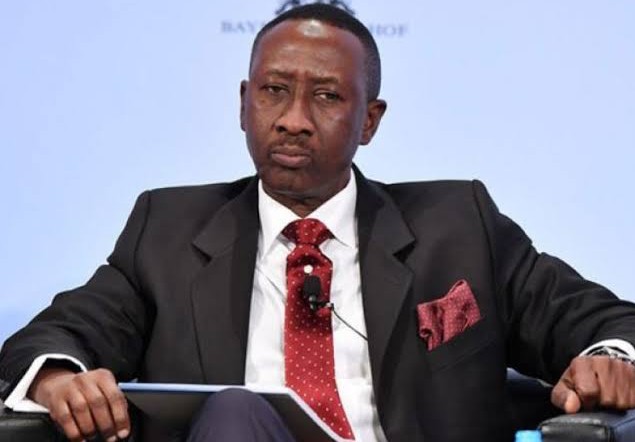Opinion
A note on Tinubu’s presidential ambition

By Adebayo Obajemu
In a layman’s language, ambition is a pursuit of a specific goal, or a feeling or desire to achieve a particular target or own a thing.
Every human being whatever their calling, tribe and tongue, has one ambition or another at any point in time; irrespective of status, class ,gender or station in life.
So, when a former Lagos State governor, Asiwaju Bola Ahmed Tinubu made public his presidential ambition; he has not broken any known law of the land by so doing, neither has he stepped on fundamental human rights of any citizen by his declaration.
So why the so much furore , so much dust about his declaration? Why has his declaration of intent generated so much concern in the public sphere than what is ascribed to good governance, insecurity, unemployment , current state of anomie in our land and all the wrong we are currently experiencing in the polity?
In our land, our people suffer from collective amnesia, and our cognitive and epistemological faculties more often take to flight in critical times and at critical junctures when they should be nimble and strong, and capable of informed rational analysis unbiased by sentiments .
Our predilection to predetermined mischief is stronger than our predisposition to be honest and unbiased in our outlook. And this mischief is most times borne out of envy. This is often the crux of the matter.
And before coming to an analysis of a Tinubu presidency , forgive me for a little digression to the subject of envy, especially a nexus between it and Tinubu bashing that has become a reference point in both social and mainstream media.
But before a look at envy as seen by some thinkers, let me just say this that Bola Ahmed Tinubu remains the most vilified politician in Nigeria in the first quarters of the 21st century. The reasons for this acidic vilification when placed on a pedestal of rationality do not often add up.
The reasons adduced are as absurd as they border on envy.
One, they say Tinubu is the most corrupt Nigerian, ask them for an evidence; none: their alibi is that he’s believed to own half of Lagos. When it comes to Tinubu’s matter reason flies away , even surprisingly among intelligent men and women.
He wants to establish a political dynasty! how? They say his daughter is the head of the market women in Nigeria, his cousin or so is the governor of Osun State, and his protege’s and associates are everywhere in position of influence.
All the ‘sins’ said to have been committed by Tinubu are in Nigeria actually a part of the paraphernalia of the office of every politician in Nigeria from Buhari to Owelle Rochas Okorocha, from Saraki to a Ganduje to every politician in the land. Yet, the most successful of them all- Tinubu- must be the sacrificial lamb, the fall guy, in spite of the fact that the fall guy is the finest in terms of political contribution, value addition to national development, creative fishing out of intelligent proteges; and employment to many Nigerians as seen evidentially in many jobs Tinubu has created.
He is corrupt they say, yes his own corruption has a method as manifested glaringly in his many businesses where Nigerians are gainfully employed. Corrupt as any other politician, yet how many jobs have the other corrupt politicians created? The proceeds of their own corruption are stashed away in European capitals and Switzerland where they are put to develop those lands.
This brings us to the question of envy, and the role it plays in shaping our perception in blurred understanding of others.
According to Stanford Encyclopedia of Philosophy, envy is a complex and puzzling emotion. It is, notoriously, one of the seven deadly sins in the Catholic tradition. It is very commonly charged with being (either typically or universally) unreasonable, irrational, imprudent, vicious, or wrong to fee
Most philosophers who have sought to define envy agree in treating it as a form of distress experienced by the subject because he does not possess the good and the rival does, and in attributing a desire for the good to Subject.
Many, but not all, go on to add that envy involves a desire that the rival not have the good. Envy is widely but not universally agreed to be a symptom or instance of the human tendency to evaluate one’s well-being comparatively, by assessing how well one is doing in comparison with others.
Influential definitions of envy include:
Envy is pain at the good fortune of others. (Aristotle, Rhetoric, Bk II, Chapter 10)
Envy is a propensity to view the well-being of others with distress, even though it does not detract from one’s own. [It is] a reluctance to see our own well-being overshadowed by another’s because the standard we use to see how well off we are is not the intrinsic worth of our own well-being but how it compares with that of others.
[Envy] aims, at least in terms of one’s wishes, at destroying others’ good fortune. (Kant, The Metaphysics of Morals 6:459)
Envy is that passion which views with malignant dislike the superiority of those who are really entitled to all the superiority they possess. (Adam Smith, The Theory of Moral Sentiments, p. 244).
Nothing demonstrates the venom of envy than the character of Iago in Shakespeare’s Othello, where his envy is said to be a ” motiveless malignity “.
“The motive-hunting of motiveless malignity,” occurs in a note Samuel Taylor Coleridge wrote in his copy of Shakespeare, as he was preparing a series of lectures delivered in the winter of 1818-1819. The note concerns the end of Act 1, Scene 3 of Othello in which Iago takes leave of Roderigo, saying, “Go to, farewell. Put money enough in your purse,” and then delivers the soliloquy beginning “Thus do I ever make my fool my purse.” Here is Coleridge’s note:
The triumph! again, put money after the effect has been fully produced.—The last Speech, the motive-hunting of motiveless malignity—how awful! In itself fiendish—while yet he was allowed to bear the divine image, too fiendish for his own steady View.—A being next to Devil—only not quite Devil—& this Shakespeare has attempted—executed—without disgust, without Scandal!— (Lectures 1808-1819 On Literature 2: 315).
Coleridge’s phrase is often taken to mean that Iago has no real motive and does evil only because he is evil.
It is in light of pure evil for its own sake that one should view Tinubu’s bashing as a pastime. The idea has some touch of what the Germans would call ” schadenfreude”, that is happiness at the misery of others, to prevent others from having what one can not get.
Beyond the emotions and pure sentiment, the truth remains that Tinubu is the most important political asset the Southwest has to day, and the strongest bargaining chip the region has, if he’s supported. This goes beyond whether one likes him or not, it is about pragmatism, about reality. He stands in good stead to speak our language , he understands the needs of Nigeria today and he has demonstrated this reality in Lagos State which today remains a reference point of development.
He is urbane, detribalised, cosmopolitan and at home in politics and economics, and he has about the widest social and political capital among politicians across the country.
We can not quarrel with his ambition, he should be left alone to square off with others in the party primary, and if he wins, he wins and if he loses , he loses, but he has absolute right to contest.
Picking on him for criticism among those who have indicated interest amounts to envy. We encourage open contest and a level-playing ground at the primaries and the election proper.
This is not an apology or makeover campaign piece for Asiwaju, afterall, he has his own profound failings like all mortals, but a fervent plea to leave the man alone to achieve his dream. We all have our individual dreams.









